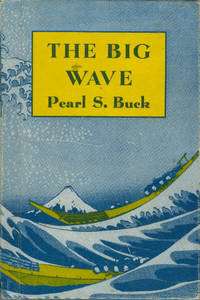The Big Wave
The Big Wave is a 1948 novel by Pearl S. Buck. She won the Child Study Association's Children's Book Award for The Big Wave.[1]

Plot
Kino lives with his family on a farm on the side of a mountain in Japan while his friend, Jiya, lives in the fishing village below. Though everyone in the area has heard of the big wave no one suspects that when the next one comes, it will wipe out Jiya's entire family and fishing village below the mountain. Jiya soon must leave his family behind in order to keep the fisherman traditions alive.
Jiya, now orphaned, struggles to overcome his sadness and is adopted into Kino's family. He and Kino live like brothers and Jiya takes on the life of a farmer. Even when the wise Old Gentleman offers Jiya a wealthy life at his rich castle, Jiya refuses. Though Jiya is able to find happiness again in his adopted family, particularly with Kino's younger sister, Setsu, Jiya wishes to live as a fisherman again as he comes of age.
When Jiya tells Kino that he wishes to marry Setsu and return to the fishing village, Kino fears that Jiya and Setsu will suffer and it is safer for them to remain on the mountain as a farmer, thinking of the potential consequences should another big wave come. However, Jiya reveals his understanding that it is in the presence of danger that one learns to be brave, and to appreciate how wonderful life can be.
Adaptations
Pearl S. Buck worked with Tad Danielewski to develop the script for television (1956), and the show played successfully to critics.[2][3] Buck also worked closely on the film version, The Big Wave (1961) which Danielewski directed.[4][3] The film starred Sessue Hayakawa, Mickey Curtis, and Juzo Itami.[3] Singer Judy Ongg also appeared in the film.[5]
References
Citations
- "Bank Street - List of Winners". www.bankstreet.edu. Archived from the original on 2017-01-26. Retrieved 2017-01-26.
- Conn (1996), p. 342.
- Hischak, Thomas S. (2014). Literature on Stage and Screen: 525 Works and Their Adaptations. McFarland. pp. 24–25. ISBN 978-0-786-49279-4.CS1 maint: ref=harv (link)
- Conn (1996), p. 344.
- Suzuki (2018), p. 83.
Bibliography
- Conn, Peter (1996). Pearl S. Buck: A Cultural Biography. Cambridge University Press. pp. 314–315, 342, 344. ISBN 0-521-56080-2.CS1 maint: ref=harv (link)
- Suzuki, Noriko 鈴木紀子 (2018). "Amerika to Nihon no kakehashi ni: Pāru Bakku Ōtsunami to sengo reisenki nichibei bunka kankei" アメリカと日本の架け橋に―パール・バック『大津波』と戦後冷戦期日米文化関係― [As bridge between the US and Japan―Pearl S. Buck's The Big Wave and the US-Japan cultural relationship in the Cold War era―] (PDF). Int J Hum Cult Stud. Otsuma Women's University (28): 82–96. doi:10.9748/hcs.2018.82.CS1 maint: ref=harv (link)